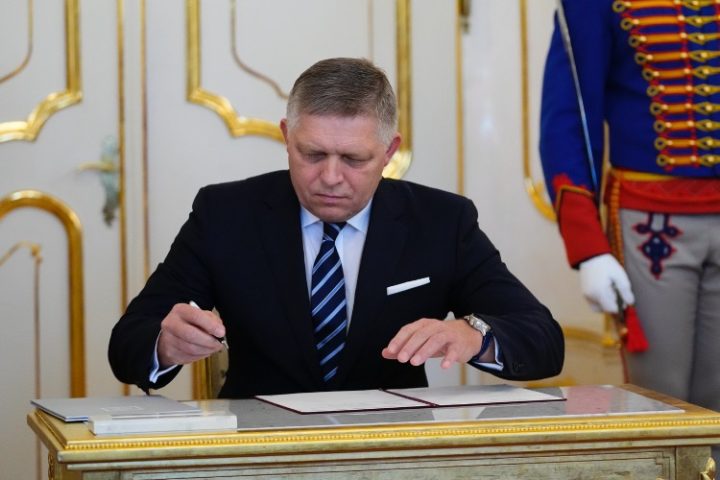
Elites in the EU have been shaken by recent political changes in Bratislava, with a new government under Robert Fico sworn in on Wednesday, October 25, almost a month after parliamentary elections that saw Fico’s Smer party emerging at the top in results.
Fico and his Cabinet were appointed Wednesday afternoon, with the new ruling coalition in Bratislava — with 79 out of 150 seats in the Slovakian Parliament — made up of Smer, the center-left HLAS (Voice), and the nationalist Slovak National Party (SNS).
HLAS, led by Fico’s former deputy in Smer, Peter Pellegrini, obtained 27 seats. Pellegrini left Fico after Smer lost the previous election in 2020, and replaced Fico as prime minister after the latter was forced to resign in 2018.
“Today, you just don’t take over power but naturally also responsibility for the republic and its citizens,” Slovak President Zuzana Čaputová told the new Cabinet.
“On behalf of the Slovak government, I’d like to promise that we will be a constructive government,” Fico said. “You will hear a sovereign Slovak voice from the Slovak government, from the Slovak ministries.”
Observers have contended that Fico’s election victory may signify a drastic change in Slovakia’s foreign policy and could undermine a fragile united front by NATO and the EU.
A NATO and eurozone member, Slovakia has economically suffered as a result of the Russo-Ukrainian conflict that erupted in February 2022. In turn, Fico has pledged to halt aid to Ukraine and support peace talks between Moscow and Kyiv.
According to a report by Politico, Eurocrats are wary of an expanding anti-war bloc within the EU, with officials privately bemoaning the quick formation of the new Slovakian government.
Noted for transitioning from support for post-Soviet social democracy to a type of left-wing populism in recent years, Fico has served as Slovakia’s prime minister twice, and was forced to resign following claims that the Slovakian state plotted to murder investigative reporter Ján Kuciak in 2018.
While the formation of the new Slovakian government happened largely without incident, President Čaputová almost gave rise to more political uncertainty when she refused to nominate an environment minister from the nationalist SNS owing to his disavowal of “climate change.”
Present-day Slovakian politics is known for its deep political fragmentation and has been encumbered by internal chaos following Kuciak’s murder. The economic consequences following the Russo-Ukrainian conflict, with the ruling center-right coalition collapsing in December 2022, have made the political situation even worse.
Fico and his new administration have already riled progressives, with the European Parliament’s center-left S&D group suspending his Smer party due to the latter’s openness to collaborating with nationalists and its lack of support for Ukraine.
Progressive pundits have voiced concerns that Fico would attempt to mimic the conservative policies of Hungary’s Viktor Orbán, though such a possibility has been glossed over by other observers, who highlighted that Fico’s new three-way coalition government between his post-left social democrats and nationalists would be by its very nature far less stable than Hungary’s Fidesz.
During his election campaign, Fico emphasized the need for Slovakia and Europe to adopt an independent geopolitical path when it came to Ukraine and ties with Russia, pledging not to dispatch “another bullet” to the warzone.
Bratislava’s new administration comes as the EU is gearing up for preliminary talks regarding Ukraine’s EU accession, with many EU member states already voicing private reservations about integrating Ukraine, and France proposing the establishment of a two-tier union to manage Ukrainian membership.
Meanwhile, in the Netherlands, Pieter Omtzigt’s Nieuw Sociaal Contract (NSC) party, set up in August 2022, has published its manifesto in view of impending Dutch parliamentary elections on November 22.
Key highlights in the report are the party’s call for a more stringent migration policy and a focus on national sovereignty in the wake of an encroaching EU.
Omtzigt, an MP, member of the Council of Europe, and one of the Netherlands’ most fêted politicians, established the party after a fallout with his former political party, the Christian Democratic Appeal (CDA/EPP).
He shot to fame after unveiling state wrongdoing in the country’s 2020 child-benefit scandal, during which tens of thousands of parents were unfairly slammed for having committed fraud by allegedly misusing said benefits. Many parents fell into poverty owing to debts incurred as a result of such allegations.
The NSC seeks a steep decrease of migrants to deal with the Netherlands’ long-standing problem of mass migration that has undermined the country’s systems. Hence, the NSC suggested a target figure of 50,000 migrants annually, which would include those who live in the country for work (short-term or long-term), study, asylum, or to reunite with family. Under such a scheme, the party claims, the Netherlands’ total population would remain below 20 million by around 2050.
The NSC also called for a tougher deportation policy and for the setting up of the office of a minister for migration policy.
Other points mentioned in its manifesto include the construction of two nuclear power plants, decreasing nitrogen to restore biodiversity, and shrinking the livestock population.
Although the party has championed a “greening of industry,” it does not want to “drive it out.” It has urged for more offshore wind turbines and solar panels on rooftops, but has refrained from committing to large wind farms and solar fields.
Regarding the EU, the party hopes to avoid an “ever closer union,” and instead advocates a firm position from the Netherlands, “constructive but realistic, without creeping transfers of tasks, powers and budgets that erode national sovereignty.”
The party called for power to be exercised on the principles of subsidiarity at “as low a level as possible.” According to subsidiarity principles, the EU would take action “only if it is more effective than national, regional or local measures.”
To that end, the NSC would include the option of discussing opt-outs from EU policies on the table, and has called for the introduction of a legal mechanism that would oblige the government to respect the opinion of the Dutch Parliament when voting on legislative proposals at the EU level.
Should the Dutch government disagree with some EU legislative proposals, because of either “insufficient support, workability or excessive costs,” the NSC could form a blocking minority with like-minded EU states, enabling the Netherlands to “opt out and not participate in any new legislative or policy initiative” should no other EU countries wish to ally with it.
The NSC’s proposals bring to mind ideas from the agrarian protest party Farmer-Citizen Movement (BBB), which formerly included the idea of such opt-outs from the EU’s migration and environmental policies in its own election program.
With the Dutch elections just around the corner, Omtzigt’s party is presently leading in various surveys. Mainstream parties, especially Mark Rutte’s VVD and the joint Labour and Green list under previous EU climate chief Frans Timmermans, nonetheless remain a legitimate rival force, trailing not far behind.
In 2020, Omtzigt wrote a book titled A New Social Contract, with a 40-page “jumping off point,” which now serves as the foundation for his new party’s political program,



